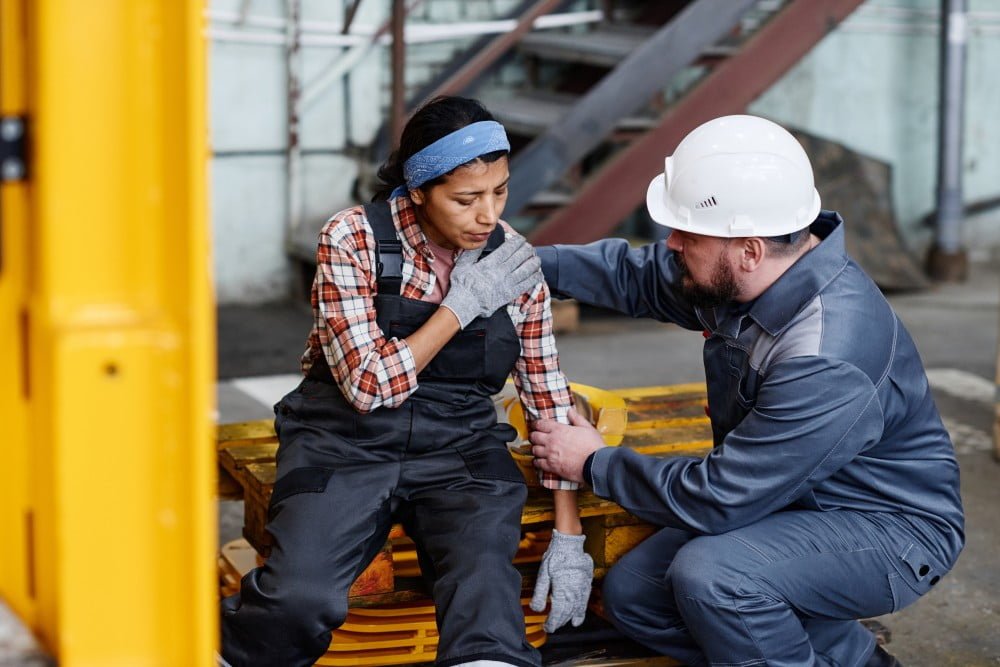Millions of Americans are injured or even killed at their workplaces every year. In most cases, workers’ compensation will pay benefits to these injured workers or their families.
But when does workers’ comp pay benefits? Who is covered, and what kind of benefits are you entitled to receive under SC’s workers’ compensation laws?
In this article, we will cover the basics of workers’ compensation in South Carolina, including:
- When workers’ compensation insurance will pay benefits,
- The types of injuries that are covered by workers’ comp, and
- The types of benefits you may be eligible to receive on a temporary or permanent basis.
Workers’ Comp Basic Rules
The basic rule is that workers’ compensation will pay benefits when you 1) suffer an accidental injury 2) while you are “on the clock.” Fault doesn’t matter – you don’t have to prove that your employer or someone else was negligent, and you are covered even if the accident was your own fault.
What is Covered Under Workers’ Comp in SC?
Did You Suffer an Injury?
SC Code § 42-1-160 defines “injury” as an accidental injury “arising out of and in the course of employment.”
This could include a broad range of potential injuries in the workplace, like:
- Falls,
- Auto accidents,
- Eye injuries,
- Broken bones,
- Crushing injuries,
- Machine or heavy equipment injuries,
- Electric shocks or burns,
- Amputations,
- Dislocations, or
- Any injury that causes you to miss work or spend money on medical expenses.
It does not include injuries that are not “accidental” or that are not related to your job duties – for example, if you are horsing around or get into a fight with a co-worker while you are on the clock, workers’ compensation insurance does not cover injuries you sustain from the fight.
Ordinarily, on-the-job injuries result from sudden events like a crushed hand or a broken arm, but § 42-1-160 also includes “accidental” injuries that occur over time, like:
- Repetitive trauma injuries like carpal tunnel syndrome, tendonitis, or bursitis,
- Occupational diseases including those caused by inhalation of chemicals, toxic fumes, or dangerous particles over time, and
- Heart attacks, strokes, and mental injuries under limited circumstances.
Did the Injury Arise Out of and in the Course of Your Employment?
The injury must have arisen “out of and in the course of your employment.”’
Insurance defense lawyers will work hard to claim that your injury did not happen at work or that you were not engaged in “work activities” when the injury occurred, because this is one way for the insurance company to get out of paying your benefits.
If you were engaged in an activity that is required by your job duties when the accident happened, you should be covered by workers’ compensation.
For example, you should be covered when:
- You fall from a roof, and your job is to install roofing materials,
- You develop carpal tunnel syndrome, and your job is to type on a computer,
- You are electrocuted by a loose wire, and your job is to install wiring, or
- You are injured in an auto accident when your boss tells you to go pick up supplies from the store.
You are probably not covered by workers’ compensation if your injury results from:
- A fistfight with a coworker,
- An auto accident on your way to the grocery store to pick up dinner for your family,
- Lung cancer caused by cigarettes you smoke on your breaks, or
- A fall from the roof, when your job does not require you to climb on the roof.
Types of Workers’ Compensation Benefits
If you suffer an accidental injury on the job that is covered by workers’ compensation, what kind of benefits does it pay?
Workers’ comp benefits are limited to your medical expenses and wage replacement benefits that pay up to 2/3 of your average weekly wage. Depending on your circumstances and the stage of your case, you may receive partial or total temporary or permanent benefits.
Temporary Workers’ Comp Benefits
You should be eligible for temporary workers’ compensation benefits if you are out of work for at least eight days after your injury. Your temporary benefits should continue until 1) your doctor clears you to return to work, or 2) you have reached maximum medical improvement (at which point you may be eligible for permanent benefits).
Temporary Total Disability (TTD) – the injured worker will receive benefits covering their medical expenses and 2/3 of their average weekly wage until they are cleared to return to work or until they have reached maximum medical improvement.
Temporary Partial Disability (TPD) – if the injured worker is cleared for “light duty,” they will receive benefits that pay up to 2/3 of the difference between their average weekly wage and the compensation rate for the light duty assignment until they are cleared to return to full duty or until they have reached maximum medical improvement.
Permanent Workers’ Comp Benefits
Once the injured worker has reached maximum medical improvement, they will be assigned an impairment rating and a disability rating that determines whether their disability is partial or total. The maximum length of time that the injured worker will continue to receive workers’ compensation benefits is determined by the body part or parts that are affected.
For example, under SC Code Section 42-9-30, you may receive benefits for up to 65 weeks for the loss of a thumb, 85 weeks for the loss of a hand, 220 weeks for the loss of an arm, or 195 weeks for the loss of a leg. The back and shoulder are valued at 300 weeks generally or up to 500 weeks for the back if you lost more than 50% of the use of your back.”
Permanent Partial Disability (PPD) – if the injured worker’s disability rating is less than 100%, the amount of benefits may be reduced by that amount. In most cases, the worker can negotiate a lump-sum settlement based on the maximum number of weeks and their disability rating.
Permanent Total Disability (PTD) – SC Code Section 42-9-10 defines “total and permanent disability” as “the loss of both hands, arms, shoulders, feet, legs, hips, or vision in both eyes, or any two thereof.” You may also be entitled to total and permanent disability if you have an injury that affects two or more body parts and the injury renders you unable to return to the job market. In most cases, benefits for permanent total disability are capped at 500 weeks, but, in some cases, the injured worker may be eligible for lifetime benefits.
Questions About Workers’ Compensation in SC?
Your South Carolina worker’s compensation lawyer will help you to file your claim, prepare your medical evidence, calculate your workers’ compensation benefits, and represent you before the workers’ compensation commission for any hearings and appeals.
Call now at 803-356-2800 or send us a message online to speak with a SC worker’s compensation lawyer today.


